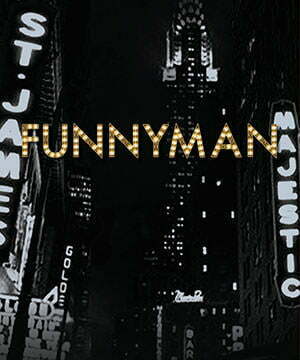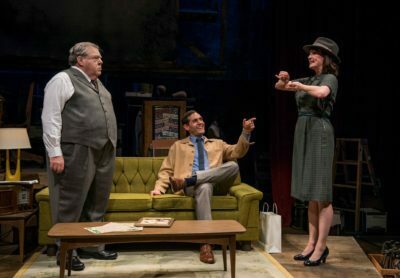Funnyman
By Bruce Graham
Directed by BJ Jones
Produced by Northlight Theatre, Skokie
The Lives of Absurdists and Vaudevillians Meet
Earlier this year, Northlight debuted Bruce Graham’s White Guy on a Bus, a story about revenge, race, and political correctness, which starred Francis Guinan. Less than a year later, the company, managed by Graham’s frequent collaborator BJ Jones, is producing another new work by Graham, Funnyman, which has quite different subject matter. It is an installment in a trilogy unrelated to White Guy, but has a similar main character, played by George Wendt. Both are men who rose from dismal childhoods to attain fortune, only to encounter personal tragedies that brought out the darkest parts of their personalities. But the protagonist of Funnyman, rather than becoming vengeful, compensates for his misery through comedy, until his career’s past its prime, and the people stop laughing. Inspired by the life of Bert Lahr, who was famous for playing The Cowardly Lion in The Wizard of Oz before playing Estragon in Waiting for Godot on Broadway, Grahm’s new play explores what makes the absurd funny.

We know immediately by seeing Jeffrey D Kmiec’s scenic design that this is a show about show business. There is a ghost light onstage, and the back of Northlight’s theatre is visible, along with the fire curtain and some storage space. The opening scene takes place in a 1959 TV studio, where aging comic Chick Sherman (Wendt) is giving a hard time to the director of an antacid commercial. Outfitted like Little Lord Fauntleroy, Chick complains that kids like the director don’t know what’s funny anymore. The omnipresent voice of the director responds that Chick’s vaudeville style is no longer relevant, and probably offensive. Still livid afterwards at such an insulting presumption—Chick’s comedy was always self-effacing—Chick asks his agent, Milt (Tim Kazurinsky) whether there are any options for shows, so he doesn’t have to keep relying on commercials for money. Milt dances around the question a little, but the truth is, there isn’t much, except for an off-Broadway experimental piece called Lucy’s Kitchen.

Meanwhile, Chick’s life at home is strained. His daughter, Katherine (Amanda Drinkall), recently graduated with an advanced degree in library science, and has moved in with him while she works in Carnegie Hall’s archive. She spent most of her childhood in a boarding school in Vermont, and has never seen her father for extended periods until now. Despite her curiosity about her deceased mother, he prefers to keep things distant between them. Frustrated, she turns to Milt for more information, but he’s been sworn to silence. However, Chick’s unhappy condition prompts Milt to take a closer look at Lucy’s Kitchen, whose director, the highly academic beatnik Matthew Baroni (Steve Haggard) he is meeting. Truthfully, Baroni, says, he has no interest in Chick, but the playwright, Victor LaPlant (Rob Lindley) is a huge admirer of vaudeville humor. Milt surprises himself by thinking the role would be a great one for Chick. After reading the play, Chick is skeptical of its grimness and claims not to understand it, but Milt persuades him explore further, and invests his own money. Chick takes the part.

At the level of pure plot analysis, Katherine’s relationship with Chick is not as well-integrated with his foray into absurdist theatre as it could be. Even learning that she is a fan of LaPlant doesn’t seem to particularly motivate him take the offer seriously. Thematically, however, her search for truth is quite important. Chick comes from a time when dark subjects like suicide and mental illness simply were rarely discussed in public. Even when the conversation turns to Milt’s son, killed during the storming of Normandy, Chick shakes his head and says “why bring all that up?” To him, the use of genuine, personal pain onstage is not only unseemly, but pushes the ethical boundaries of what playwrights and directors can demand from actors. We learn that the routine his parents performed with him while touring was physically abusive, and Chick takes pride in having transformed Vaudeville stages into safer places. To him, modern writers have found a new way of making theatre ugly again. On the other hand, LaPlant is a kindred spirit, and understands better than most people that suffering and humor build off of each other.

Wendt makes Chick’s conflicted feelings quite clear, as well as his desire to shield his family and child fans from the crueler aspects of life, and his obnoxiousness while doing so. He also is frighteningly plausible as Chick constantly complains about his ailments, and gives off the feeling that Chick is running out of time to secure his artistic legacy for reasons that have nothing to do with money. As his sidekick who is also his brain, Kazurinsky is quite funny himself, and expresses the same ambivalence about the proper place for personal issues in public, only without as much ego or personal dislike for the younger artists. Drinkall’s scenes are split between those with the older men, and those with Michael Perez as her love interest, Nathan Wise. That name was given to him by his communist playwright parents, but he doesn’t seem to get the Lessing reference. He dislikes their politics and their aloofness, but still feels compelled to defend their work. Thematically, this sub-plot is distantly tied to Catherine’s feelings about her father, but in terms of story, it is difficult to justify why this gets so much stage time, despite Drinkall and Perez making a cute couple.
Still, Funnyman is an insightful take on a transformational period in theatre history. At times Graham labors a bit hard to emphasize Chick’s nobility, but he’s such a curmudgeon, the impulse to go too far balancing him by granting him twenty-first century attitudes is understandable. However, the more extreme aspects of Chick’s backstory are grounded in the actual tumultuous lives of silver screen stars, and big emotions are appropriate in a work that contrasts the commercial and experimental theatres. I would have liked to have seen more of Chick’s artistic development, since despite his disdain for the new practices, he must have absorbed a little of them. But what the script provides, BJ Jones directs into a fine production.
Recommended
Jacob Davis
Playing at the North Shore Performing Arts Center, 9501 Skokie Blvd, Skokie. Tickets are $25-79 with discounts for students; to order, call 847-673-6300 or visit northlight.org. Performances are September 29 at 7:30 pm, Wednesdays at 1:00 pm and 7:30 pm, Thursdays at 7:30 pm, Fridays at 8:00 pm, Saturdays at 2:30 pm and 8:00 pm, and Sundays at 2:30 pm, with select performances are 7:00 pm through October 18. Running time is two hours, with one intermission.
